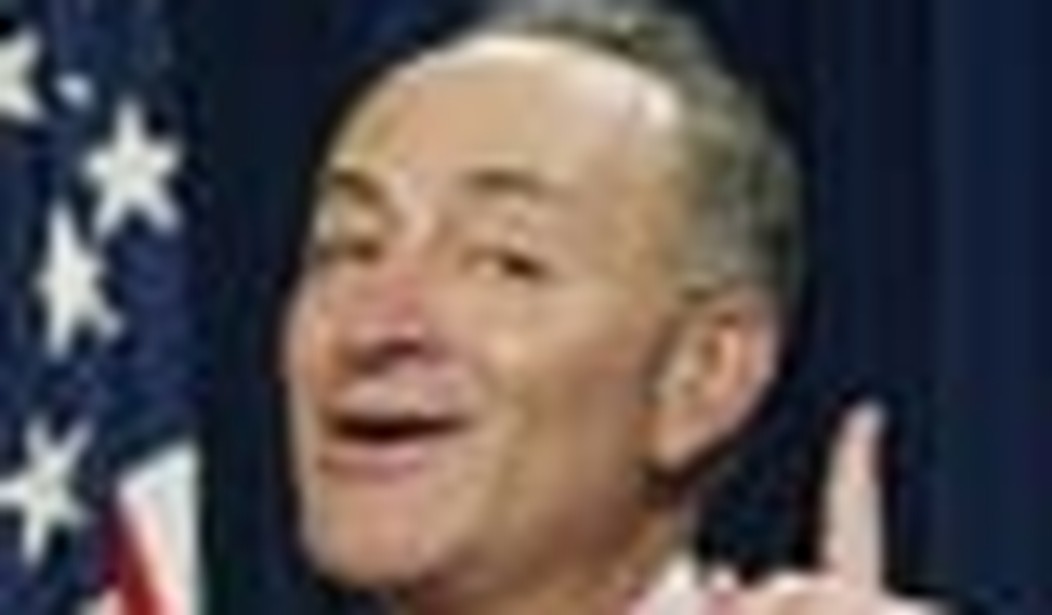January’s Supreme Court ruling freed corporations, unions, and non-profit groups to air political advertising during election season, repealing a key part of the 2002 McCain-Feingold campaign finance law. To counter this, Maryland Representative Chris Van Hollen and New York Senator Charles Schumer, both Democrats, plan to introduce legislation to require these organizations to disclose who’s behind each advertisement. From Van Hollen:
We’re exploring ways to enhance transparency and disclosure of a range of political expenditures.
Excellent idea. But why don’t congressmen practice what they preach? Congressional Democrats appear focused on the U.S. Chamber of Commerce:
The nation’s biggest business lobbying group, the Chamber spent $47 million on so-called issue advertising last year. … An additional $144 million of Chamber spending went for lobbying last year. … That spending isn’t affected by the court ruling or proposed legislation.
What seems to be the key issue is that the Chamber ran ads supporting 10 Republican candidates in 2008, and spent another $1 million supporting Massachusetts Republican Senator Scott Brown’s candidacy. To put the Chamber’s $191 million in perspective, during the 2008 election cycle:
— Unions contributed over $60 million to pro-Democratic 527s, and 92% (over $68 million) of their direct campaign contributions went to Democrats.
— Democrat/Liberal 527s spent over $160 million on issue advertising, compared to Republican/Conservatives’ $61 million.
— Ideology/Single Issue organizations spent $304.7 million, with 66% (over $200 million) going to Democrats. They spent another $167.6 million on 527s.
— Lawyers and law firms spent $233.7 million, with 76% ($178.7 million) going to Democrats.
Open Secrets is the internet resource run by the Center for Responsive Politics (CRP), an organization claiming to be “the nation’s premier research group tracking money in U.S. politics and its effect on elections and public policy.” They argue that congressional gun control deliberations reflect support for gun rights because the “gun lobby” buys more votes. Open Secrets explains this money-for-votes premise:
If lawmakers are guilty of tiptoeing around gun control issues, it is because the NRA and other gun rights groups wield an enormous amount of influence in Washington. The source of that influence is money.
Open Secrets reports the entire “gun lobby” contributed $2,397,743 during the 2008 election cycle.
The Associated Press concurred:
Campaign contributions from the NRA are proving to be an accurate barometer of how individual senators would vote on gun control.
According to these sources, money insures successful election campaigns and buys congressional votes from grateful recipients. In this vein, there’s a positive correlation between lawyer campaign contributions and pro-gun control voting. The 223 incumbent House Democrats reelected in 2008 averaged an NRA grade of D+, highlighting their support of gun control. Lawyers contributed 6.9% of their total campaign contributions. The 156 incumbent House Republicans averaged an NRA grade of A, garnering 3.5% in lawyer contributions. F-graded Democrats received 7.2% of their funding from lawyers, while A-graded Democrats received 6.0%, and Democrats receiving A+ NRA grades averaged 5.1%.
If money buys influence, how does it reflect on Democrats’ stated goal of transparency?
During the 2008 election cycle, one of Obama’s biggest donors was the law firm of Skadden, Arps, Meagher and Flom, LLP, which contributed $530,839 to his presidential campaign. They contributed a total of $1,716,042; 82% (over $1.4 million) went to Democrats.
Skadden, Arps represents the inventors of a “firearm safety system,” which adds a biometric activator that links a gun to one owner. The “Summary of the Invention” section of the patent application notes:
The safety system further makes use of a person’s fingerprint data, which is a unique personal property that is highly suitable for tracking and control.
This requires gun registration and owner licensing, tying the firearm to the owner in a centralized database.
Sidley Austin LLP contributed $588,598 to Obama. Out of a total of $1,446,041, 81% (about $1.2 million) went to Democrats.
Sidley Austin represented the inventors of the “Gun identification kit,” which provides a way for every gun to have a spent cartridge case made available for entry into a ballistic fingerprint database. Of course, such a database is useful only if all firearms are entered into it:
Because the vast majority of publicly owned firearms have not been used in the commission of a crime, they will not show up in [such a] database. It would therefore be desirable to provide a means for increasing the number of firearms for which … information and data is available.
The inventors’ solution is to pass a law mandating that every gun is registered:
One means of populating [such a] database would be to mandate that ballistic information be obtained and entered into the database for all firearms.
This requires the gun’s serial number, matched with the shell casing, and the owner data all reside on a permanent file.
Such registration would require that gun owners notify authorities when they move or a gun is stolen, with one likely consequence of failure being firearms confiscation, since you are now breaking a federal gun law. In this manner, a right becomes a privilege metered by the government.
Incrementally, registration becomes confiscation. Future legal “enhancements” gradually diminish ownership until people accept a ban, as happened in Britain and Australia, where registration databases made confiscation easy.
Peter Hamm, spokesman for the Brady Campaign, supports registration for this reason:
We think the District has adopted sensible gun laws. If every jurisdiction in the U.S. had reasonable laws and common sense laws … we would be fine with that sort of system.
D.C. requires owner licensing and gun registration, and bans concealed carry.
According to the money-for-votes premise, two law firms exert more influence in Congress than the entire “gun lobby,” and the Democratic Congress represents businesses with vested interests in profiting from gun control. The Christian Science Monitor estimated that gun rights groups comprise about 12 million members, compared to 150,000 for gun control groups. Placing the Open Secrets campaign contributions in context, the “gun lobby” spent about 20 cents per member in 2008.
These two international law firms total about 4,000 lawyers spread across the globe (Sidley Austin, 1,700; Skadden Arps, 2000-plus). Apparently, the Brady Campaign and Old Media consider $790 per lawyer in campaign contributions to be democracy (small d) in action, but spending 20 cents per member enables the “gun lobby” to undemocratically force members of Congress to bow to the will of 12 million Americans.
Schumer and Van Hollen are both lawyers, too. Van Hollen was endorsed by the Brady Campaign in 2008.
Curiously, neither promotes public disclosure of campaign funding during congressional voting.









Join the conversation as a VIP Member